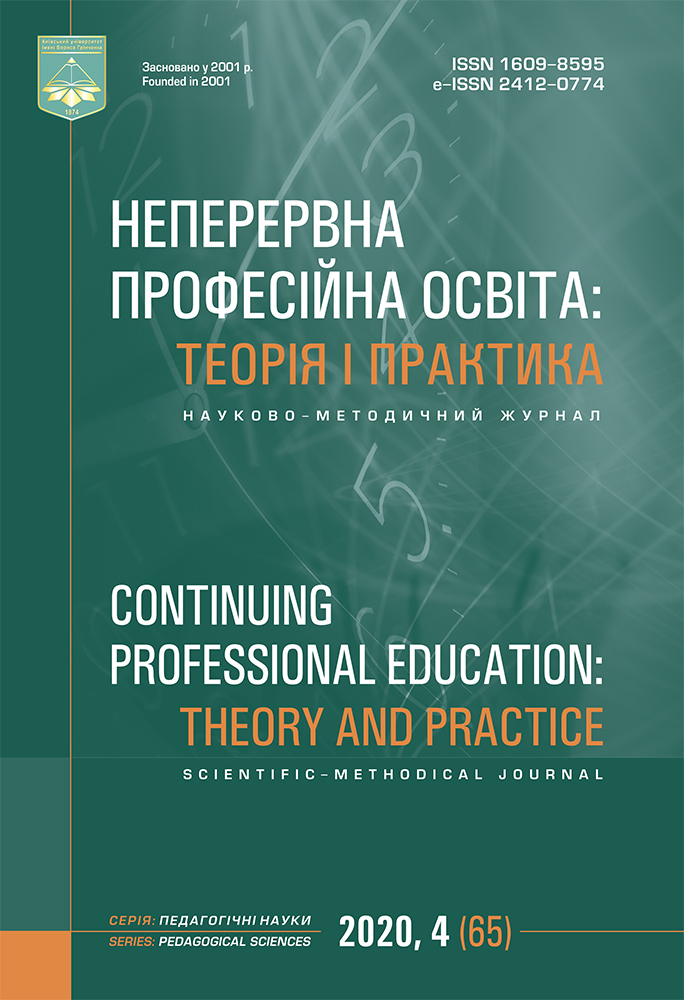DEVELOPMENT OF SCIENTIFIC COMMUNICATION OF STUDENT’S YOUTH BY MEANS OF TOURNAMENT’S COMPETITIONS
DOI:
https://doi.org/10.28925/1609-8595.2020.4.5Keywords:
higher education learners, history competitions, scientific communication, scientific research, tournamentsAbstract
This research work is dedicated to a topical theme from the science’s point of view. The main goals are to study the role of competitions in history tournaments for students in the development of scientific communication in the process of studying at university. The experimental part of the study included 130 respondents: 100 students as participants of tournament competitions and 30 jury members who evaluated the tournament games and participated in the study of this innovative phenomenon. To determine the effectiveness of tournament competitions and their role in the development of scientific communication, an observation method was used to identify the feelings and behaviour of tournament participants at different stages of the game. The comparative method was used to identify the peculiarities of tournament competitions in the system of competitions, contests held in Ukraine. The survey method was used to identify the level of achievement of participants during the tournament and the impact of tournament competitions on further study and research activities of students. The results of the study proved to be an important factor in the development of scientific communication among students. This fact caused the ability of student’s youth to work in a team and to carry out scientific research and protect own ideas. As a result of the study, it was discovered that students who studied the science themes prior to the tournament and participated in tournament competitions (public defence and opposition) had significantly higher levels of academic achievement than their classmates. A good deal of students noted that during the tournament competitions they communicated with jury members (scholars from all over Ukraine) and got much historical information according to important achievements in historical science, new ideas and concepts, little-known historians so far. According to the results of the study, it was recommended to create a scientific discussion colloquium among students who are interested in investigating science of domestic and foreign scholars.References
Admiraal, W., Vermeulen, J. & Bulterman-Bos, J. (2019). Teaching with learning analytics: how to connect computer-based assessment data with classroom instruction? Technology, Pedagogy and Education. https://doi.org/10.1080/1475939X.2020.1825992
Andersson, E. (2020). A transactional and action-oriented methodological approach to the political socialization of youth. Education, Citizenship and Social Justice, 15 (3), 243–257. https://doi.org/10.1177/1746197919853807
Eyre, D. (2007). What Really Works in Gifted and Talented Education. The University of Warwick. https://www.egfl.org.uk/sites/default/files/Gifted%20and%20Talented%20-%20what_really_works%20-%20Deborah%20Eyre.pdf
Feliú-Mójer, M. I. (2015, February 24). Effective Communication, Better Science. Scientific American. https://blogs.scientificamerican.com/guest-blog/effective-communication-better-science
Monks, F. J., Pfluger, R. (2005). Gifted Education in 21 European Countries: Inventory and Perspective. https://www.pef.uni-lj.si/fileadmin/Datoteke/CRSN/branje/Gifted_Education_in_21_European_Countries_Inventory_and_Perspective__2005_.pdf
Terman, L. M. (1954). The discovery and encouragement of exceptional talent. American Psychologist, 9, 221–230. https://doi.org/10.1037/h0060516.
Xing, W., Lee, H. & Shibani, A. (2020). Identifying patterns in students’ scientific argumentation: content analysis through text mining using Latent Dirichlet Allocation. Educational Technology Research and Development, 68, 2185–2214. https://doi.org/10.1007/s11423-020-09761-w
Aniskina, N. (2005). Pedaghoghichna pidtrymka obdarovanosti [Pedagogical support of giftedness]. Shkiljnyj svit.
Lazar, M. G. (2011). Kommunikatsiya v sovremennoynauke: sotsiologicheskie i eticheskieaspektyi [Communication in modern science: sociological and ethical aspects]. Uchenye zapiski RGGMU, 18, 236–246. http://elib.rshu.ru/files_books/pdf/18-24.pdf
Pashnjev, B. K. (2007). Psykhodiaghnostyka obdarovanosti [Psychodiagnostics of giftedness]. Osnova.
Reshetnikova, E. V. Nauchnye kommunikacii: evolyuciya form, principov organizacii [Scientific communication: the evolution of forms, principles of organization]. In Sovremennoe kommunikacionnoe prostranstvo: Analiz sostoyaniya i tendencii razvitiya: Materialy Mezhdunarodnoj nauchno-prakticheskoj konferencii (Novosibirsk, 22–24 aprelya 2014 g.), pp. (154–159). SibGUTI. URL: https://sibsutis.ru/upload/publications/9b3/uxofvwfphpyfwz%20nlcieeuzqkvzohdcsxzhcvdi.pdf
Ryuzen, Y. (2010). Novi shlyakhy istorychnoho myslennya [New ways of historical thinking]. Litopys.
Terepishij, S. O. (Ed.), Antonova, O. Ye., Naumenko, R. A. et al. (2008). Obdarovana molodj Ukrajiny: ocinka suchasnogho stanu ta poshyrennja perspektyvnogho dosvidu roboty z obdarovanoju moloddju v reghionakh Ukrajiny [Gifted youth of Ukraine: assessment of the current state and dissemination of promising experience in working with gifted youth in the regions of Ukraine]. Sojuz obdarovanoji molodi.
Downloads
Published
How to Cite
Issue
Section
License
Copyright (c) 2020 Oksana Salata

This work is licensed under a Creative Commons Attribution-NonCommercial 3.0 Unported License.



